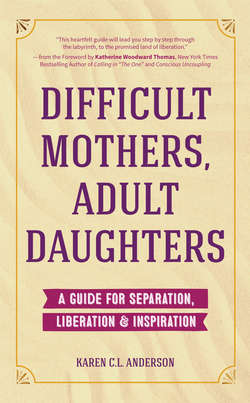Читать книгу Difficult Mothers, Adult Daughters - Karen C.L. Anderson - Страница 12
На сайте Литреса книга снята с продажи.
ОглавлениеChapter 4 Living in Either/Or Land
When it comes to your relationship with your mother, does it often feel like an all-or-nothing, either/or proposition? Maybe you feel that you have to either be defensive, resistant, and protective of yourself, or instead just roll over and let her do and say whatever she wants.
Or maybe it feels like you either have to keep your conversations shallow and surface-y or go right into the emotional deep end.
Then there are times when you think you either have to shut her out of your life for good or allow yourself to be enmeshed with her forever.
None of these options feel good. In fact, just thinking about it wears you out.
Having felt this way in my relationship with my own mother, and having worked with other women on this issue, I find it’s more common than you may think to feel this way.
At the very least, it’s slightly annoying or limiting. At the very worst, it’s intense and can feel as debilitating as impotent rage. And underlying all of it is sadness, and maybe unspoken grief.
I spent years in either/or land. Way back when, if someone had told me that it didn’t have to be this way, I’d have simply said, “You don’t know my mother.” It felt like an intractable situation, with no pleasant solution.
Now I know better. I know there are infinite choices available, not just all-or-nothing decisions. There’s immense freedom, peace, and sovereignty that comes with knowing this, along with being confident in making choices that feel good and right (and when I say that, I don’t mean making choices for your mother’s sake, for avoiding conflict, or for her approval).
So when it comes to your relationship with your mother, this I know for sure: You are not as powerless as you feel, and you can make choices that feel good and free.
I’ve been accused (mostly by mothers) of trying to push the wedge deeper between adult women and their mothers. I’ve also been accused (mostly by adult daughters) of not going far enough to promote “no contact.”
If you are emotionally enmeshed with your mother, or if your mother was distant, disengaged, and critical, I wrote this book for you. You have little autonomy (the ability to make an informed, un-coerced, non-reactive decision; the freedom to be who you are, apart from your mother) because you believe (perhaps unconsciously) that your mother’s opinions, needs, values, and desires are more important than your own.
Or you fear, on a primal level, what will happen if you choose to belong to yourself rather than belonging to
your mother.
My hope for you, as you read this book, is that you learn how to belong to yourself—how to be your own woman emotionally separate from your mother.
That you come to understand that the only person you need to take emotional responsibility for is yourself.
That you discover that when you focus on you—on your values, desires, needs, and preferences—something magical happens: the way you show up in your relationship with your mother (whether you choose to see or speak to her or not) changes in a way you never imagined possible.
That you no longer tolerate abuse and engage in dysfunctional behavior.
That you trust yourself to have and hold your boundaries, not from a defensive, reactive place, but from a solid, grounded place.
And there’s nothing more kind and respectful—to both of you and to women everywhere—than that.
Where most of us get caught up is in believing that words like “separate” and “connected” are emotions. These words do not actually express emotion, they describe thoughts, opinion, and interpretation, which, when you think them, create emotion. They express how you interpret others rather than how you feel. It’s your interpretation that creates the emotion.
This is a crucially important distinction to make, because if you are using words like these to describe emotion, you will inevitably experience powerlessness.
When you’re emotionally enmeshed with your mother, you doesn’t know where your thoughts and emotions start and hers end.
She believes that in order for her to be happy, you have to think, feel, and act a certain way (so you don’t know what you really think and feel, or how you want to be).
You believe the same thing: that in order to be happy, she has to think, feel, and act a certain way.
She has a tendency to think she knows how you feel based on how she feels.
You have a tendency to think you know how she feels based on how you feel.
I believe that true connection is somewhat of a paradox. It’s possible when you and your mother are individual, autonomous women with your own thoughts, emotions, dreams, and desires. When you know, love, and trust yourself and she knows, loves, and trusts herself. When you are able to establish loving boundaries based on what you know, love, and trust about yourself and when she is able to do the same. When the two of you let each other be who you are, the good, the bad, and the ugly.
The good news is that your mother doesn’t have to participate. She doesn’t have to know, love, and trust herself the way you do or the way you think she should.
The more connected you become to yourself, the more open you can be to connection with her, no matter where she is on her journey.
Emotional separation from our mothers is the solution and the medicine, not the thing that needs to be fixed or healed. We don’t need to “make peace” with it because it is peace.
